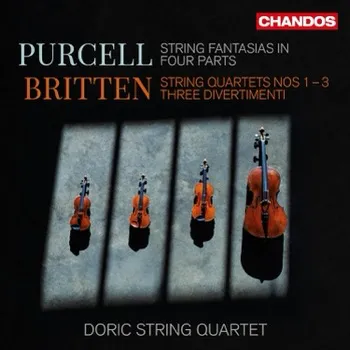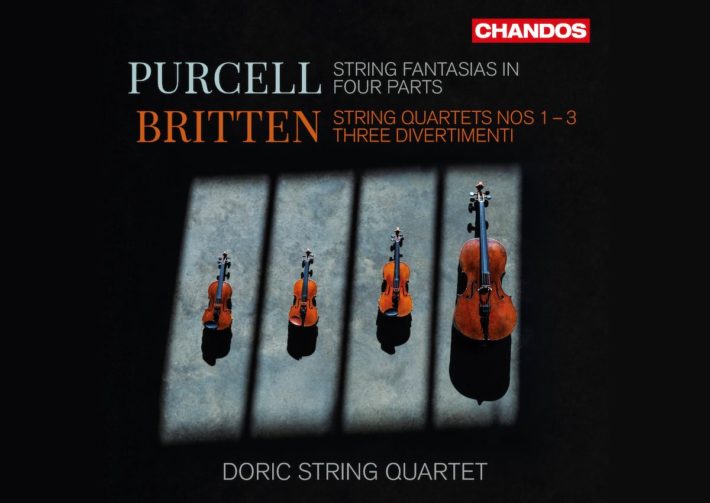There seems to be a rediscovery of this repertoire by Benjamin Britten (1913-1976) every decade or so, with releases by the Maggini Quartet (Naxos, 1998-9), The Brodsky String Quartet (2009) and the Belcea Quartet (2005) – each illuminating the string quartets and sheds new light on these works. This new release is no exception, revealing the String Quartets in another light, adding an authentic element, with the group continuing their long attachment to the composer and the Pro Corda school in Leiston, Suffolk, “just a stone’s throw from the world of Benjamin Britten”, as the group state in the album’s booklet. Violist Hélène Clément ads to the authenticity by playing the composer’s own viola.

Those familiar with the Doric Quartet’s earlier releases for Chandos will meet the group’s same distinct qualities – superb intonation, lean, planned use of vibrato and advantageous usage of the music’s contrasting elements. The first quartet (1941) is given a mesmerizing account, with the first movement clearly and effectively conveyed and with a colorful display in the slow movement, where accents are sharp, with outbursts of each instrument chillingly conveyed. This is also due to the superb recording quality, taken at Snape Maltings. In the third movement, hear how the viola takes a solo line with glissandi in the upper strings from 4:35, and fully realize the quality of this account.
The Second Quartet, perhaps the most tightly conceived composition from the three quartets, is another captivating performance, with the Doric members take special care projecting the coloristic effects made by Britten when instructing the instrument to play in large gaps in registers (here the Bartók influence is omnipresent). The dance-like episodes that follow are driven to the extreme, and when everything seems to be at a brink, the group return to the hushed atmosphere of the opening (1:48, track 1 in the second CD). The second movement is nothing but chilling in its cold precision and unique combination of the instruments. The finale is a homage to Henry Purcell – a “Chacony”, a form of variations based on a long bass line. This quartet is preceded by 5 Fantasies for 4 voices by the baroque composer, fittingly giving context to the 1945 piece (the quartet was premiered on the 250 anniversary of Purcell death at Wigmore Hall).
The Third Quartet, the composer’s swan song from 1976, is a bit less impressive when being considered alongside the excellent performances of the two earlier works; The third “solo” movement lacks in concentration, though there is some nice rhythmical vitality to the second movement and pleasurable solos in the final Passacaglia. Luckily, Deutsche Grammophon has recently reissued the Amadeus Quartet’s live version of the work, and as its dedicatees and first performers, we can really get close to the heart of the matter when listening to their account (currently only digitally available). The Doric Quartet also gives s persuasive argument for the early Divertimenti, written in the composer’s student years.
In sum, this is an important contribution to the Britten chamber discography, with superb account for the Divertimenti and first two quartets, of the best ever put on record. Previous full cycles can be added to a library of a dedicated listener of these works, whether the calmer Maggini Quartet, the more refreshingly direct Brodsky Quartet or the extremely dramatic Belcea. The Doric, as always, brings their own original personality to the works, making this an immensely enjoyable album.
Britten – String Quartets No. 1-3, Three Divertimenti
Purcell – String Fantasies In Four Parts
Doric String Quartet
Chandos Records, CD CHAN 20124




















